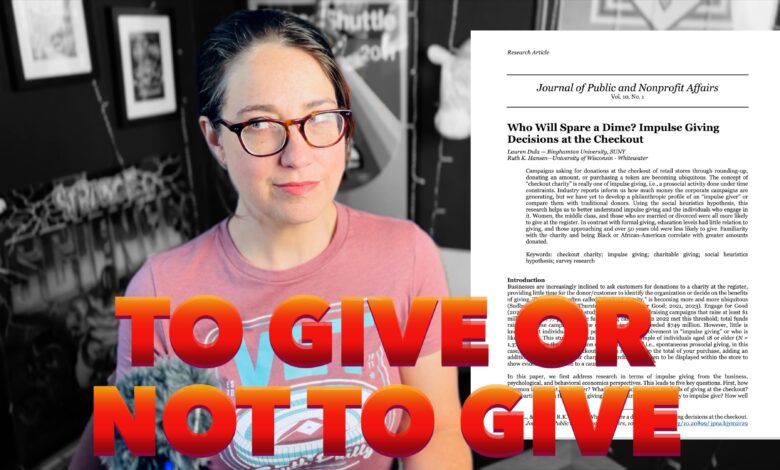Checkout Charity is Good, Actually?

This post contains a video, which you can also view here. To support more videos like this, head to patreon.com/rebecca!
Hot new study just dropped: a survey of 1,400 American adults found that in the past year, 53% of them reported impulsively donating to charity through store checkout requests.
(If this isn’t a thing in your area, it’s the practice of a cashier or a self-checkout machine, usually at a grocery store, asking if you’d like to either “round up” your total to donate some change to some specific charity, or to add a dollar or more to your total for that charity.)
That’s nice. Giving to charity is a good thing! Who could ever complain about something like that? Certainly not me. I would never do that.
Okay here’s the deal: I found this study because every few months or so, a tweet I wrote in 2019 complaining about checkout charity gets more retweets and likes and it’s often because there’s some kind of news regarding it. The first time it went viral, I used it as a launching point to talk about how evil corporations like Safeway are, and how these corporations encourage weak individual action because making strong systemic changes would negatively impact their bottom line.
I’ll be honest, it was kind of a bummer of a video. I mean, I stand behind everything I said there: individual action cannot compare to systemic change, these corporations do use your donations to market themselves as “good guys,” and these corporations are paying their executives so much more than their cashiers and other employees that they are directly responsible for income inequality that leads to many of society’s ills.
But with checkout charity in the news again this week, I figured I would take the issue from a slightly different angle: why checkout charity is good, actually.
First of all, the study itself is…fine, not groundbreaking, and only a bit interesting to the average person. It’s all self-reported, so you need to keep in mind that many people will not necessarily be truthful or accurate in their answers. Also, that headline that 53% of people say they give at checkout means just once in the previous year, not every time they go to the store. So that’s how this may jibe with your anecdotal experience of rarely ever seeing anyone agree to donate at checkout.
Also, that headline isn’t really the main thrust of the study. They were hoping to get an idea of WHO donates at checkout, HOW they donate, and how educated they are about the charity in question. The researchers found that people were more likely to donate if they’re women, Black, or younger without a college education. And that’s interesting, because it contrasts with the “usual” charitable giver, who is a white older college graduate. That means that a charity that wants to target a different demographic may have more success pairing up with a business for checkout fundraising than relying on more traditional forms of fundraising.
They also got an interesting response in how people tended to donate. There are various forms of checkout charity: you can “buy” a little paper heart with your name on it to stick on the wall, you can add on a dollar or two to your total, or you can “round up,” meaning if your groceries come to $35.47, you can choose to donate 53 cents to make it an even $36. And because it’s all done on the little pin pad, you don’t have to be embarrassed to give such a ridiculous paltry amount. And because you imagine millions of other people are doing the same thing, you can feel about it, knowing the charity will get a decent sum in the end.
Rounding up is really interesting, because it’s the sort of thing people used to do all the time when tipping waiters in order to make it easier to just leave a round dollar amount in cash on the table. As a waiter, that was kind of annoying because you’d have to go the register and take out a bunch of nickels but I understood why people did it. But once credit cards became more and more common, the habit stuck. I used to tell myself I did it to make my checkbook easier to balance, but that is ALSO not a thing anymore and people still do it. It turns out that humans just like round numbers, as researchers demonstrated in 2013 by showing that people tend to round off not just restaurant bills but also self-serve gas stations. Whomst amongst us hasn’t spent way too much energy trying to get the gas meter to hit on exactly $20? Even when paying with a credit card! Even when I have more than $20 in my checking account!
I found that study linked in this great article on NPR about this issue. As always, links to everything I talk about in every video can be found in the transcript, linked down below, so check that out if you’d like to see more hard data. But this new study definitely fits in with the consensus: people are more likely to give at checkout if they’re allowed to round up, compared to just adding a dollar or “buying” a token. And as more charities and corporations take notice of that and institute it, checkout giving is continuing to grow even as many people say they find it annoying and intrusive to be asked, and they complain about it in viral social media posts that they made a typo in and are now embarrassed every time it goes viral again.
Anyway, all of this data shows that even though I hate these corporations, and I hate that they’re using other people’s donations to boost their own image, checkout charity really is a net benefit, with charities raising hundreds of millions of dollars – nearly a billion now, in fact – that they weren’t getting before, from people who were less likely to give. And the people giving are only out some pocket change. It’s a win-win!
Right?
Well, I hear what many of you are thinking, because again, every time my whiny tweet makes the rounds I hear from people saying things like “Yeah, but the corporations just use that money to get their own tax break,” or “Yeah, but hardly any of that money goes to the actual charities.” And so I want to clear things up by saying that no they don’t and sometimes it doesn’t, respectively. Let me explain.
It’s a common myth that when you give your 53 cents to Safeway to give to the Human Fund, Safeway gets a break of 53 more cents off their taxes. That’s demonstrably not true and not how taxes work. Please note that I am not a tax professional and this is not tax advice, but when you donate 53 cents to a registered charity, YOU can write that money off on your taxes. This is actually one reason why I suspect wealthier and more educated people give larger official donations to the charities of their choice instead of smaller donations at checkout: because nobody is keeping track of the pocket change they donate while buying donuts. It’s much easier to keep track of one large donation a month, or a year, and then write that off at the end of the year.
Safeway cannot legally write off YOUR donation through them. That’s a myth. But there is a direct monetary way that they benefit from your donation, and that’s through what’s known as “float.” You see, they collect everyone’s pocket change for a day, a week, a month, or a fiscal year, or whatever is in their contract with the charity, and then they donate a bunch of it at once. There’s a period of time when they are holding a bunch of money that isn’t theirs, per se, but they can invest it in a way that garners them interest, which they get to keep. So you donate 53 cents, the Human Fund eventually gets 53 cents, and in the meanwhile Safeway collects the interest for however long they held onto it. It’s a win-win-win.
There’s also this pervasive idea that when you donate your 53 cents, Safeway and credit card processors and other middlemen take their cut and the Human Fund only ends up with 12 cents, 10 of which will go to their overhead and 2 of which go to the Humans being Funded. But that’s also not strictly true: Safeway doesn’t take anything, and because it’s lumped in with your larger bill the credit card processor’s fee is negligible. That just leaves us with what the actual charity is going to do with it, which can vary wildly.
In this most recent survey, most people who gave at checkout reported being familiar with the charity in question, which is good but doesn’t actually mean they’re truly educated about how their money is going to be used. For instance, most Americans are probably familiar with the Red Cross and have a positive attitude towards them, but as I discussed last summer, that organization has a hell of a lot of problems with the way they utilize their vast amounts of funding.
It can be really hard for the average person to figure out which charities make the best use of their money, and checkpoint charity doesn’t help the issue by giving people 3 seconds to make a decision with no other information but the name of the charity. That’s the biggest sticking point for me – when I was in my early 20s I was a door-to-door canvasser for a progressive action charity and I was so bad at it because I’d knock on a door, explain our cause (lobbying to improve Medicare to cover prescription medication), and ask for money. And a lot of people very politely said “Yeah I think I’d like to research your organization before I write a check” and I’d be like “Yeah that makes sense, I’d do that, too.” And that’s why I was very bad at that job.
Here’s a great example of when checkout charity goes wrong in that respect: in 2015, Canadian investigative reporters looked into the charity that customers were encouraged to donate to when purchasing products at Indigo, a bookstore chain like Barnes & Noble or Borders. The “Indigo Love of Reading Foundation” is technically a separate nonprofit entity from Indigo’s for-profit conglomeration, and they claim to give “about $1.5 million to Canadian schools each year in the form of grants to help libraries buy books.” That sounds great, except for the fact that the money they give to the schools comes in the form of a gift certificate they can only spend at Indigo’s stores, where they must PAY FULL PRICE FOR THE BOOKS. Customers were donating money that would just go on to become profit for Indigo.
It appears that that investigation paid off because today, the Indigo Love of Reading Foundation says that all schools can now get 30% off the books they buy with foundation funds. Bullying works, people.
So yeah, not all charities are equal. But if you really are familiar with the charity being offered at checkout, and you like them and want to toss them some change, the only downside is that the corporation gets a PR boost and probably some interest. Sure, if you are actually going to spend time researching charities and making a more substantial donation that you can write off later, that’s probably “better,” but I’m not going to let perfect be the enemy of good. If it’s easier and more likely that you’ll toss some change at checkout, go for it. Just don’t be swayed later when Walmart is bragging about “their” charitable giving. They still suck. The people who gave the money are the ones who rule.




